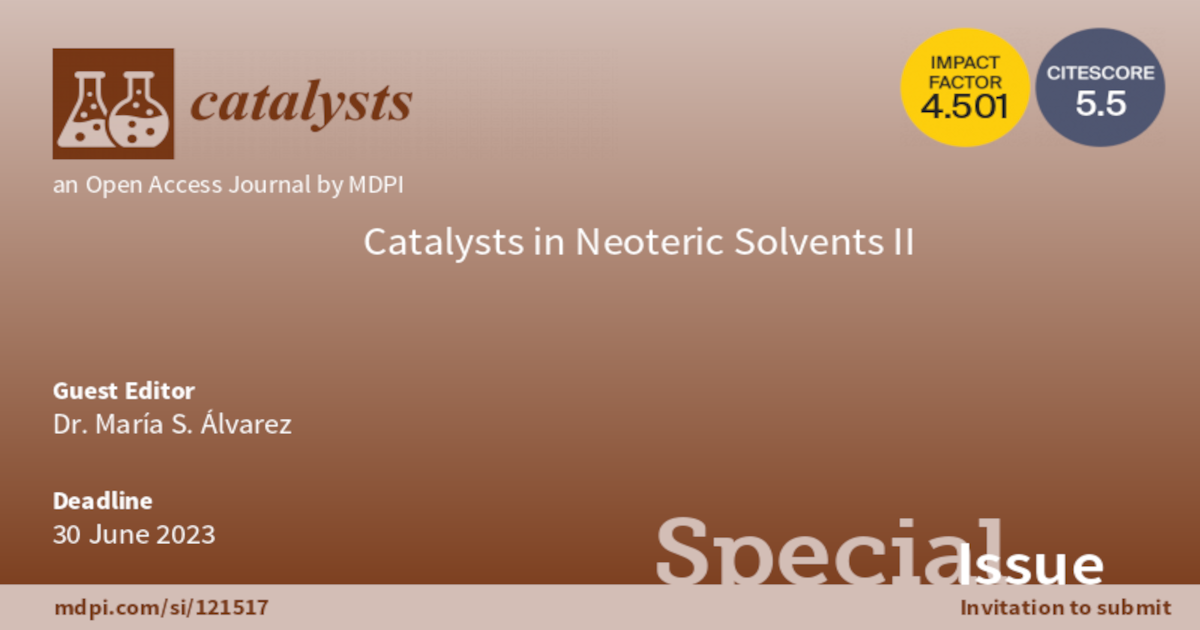Catalysts in Neoteric Solvents II
A special issue of Catalysts (ISSN 2073-4344). This special issue belongs to the section "Catalytic Materials".
Deadline for manuscript submissions: closed (31 January 2024) | Viewed by 4916

Special Issue Editor
Interests: catalysis in neoteric solvents; green chemistry; renewable energies; enzyme production; wastewater treatment; aqueous biphasic systems; byproduct valorization
Special Issues, Collections and Topics in MDPI journals
Special Issue Information
Dear Colleagues,
The need for the development of more green chemical processes has encouraged the investment of great research efforts in non-conventional solvents such as ionic liquids, supercritical fluids, or deep eutectic solvents. During the last few years, eutectic solvents have aroused great interest due to their unique characteristic of simple formulation and their low-cost or weak environmental footprint, becoming promising candidates to improve sustainability. In light of this, the aim of this Special Issue is to show the recent breakthroughs and trends in developing new catalytic systems based on neoteric solvents. Thus, I invite you to submit your original research or short review articles related to the application of eutectic solvents in catalysis reactions, the stability of biological or chemical catalysts in the presence of deep eutectic solvents and/or natural deep eutectic solvents, tolerance and toxicity in catalysis, improvements in catalytic processes developed in the presence of these neoteric solvents, or other contributions that improve our knowledge of how these eutectic solvents can improve catalysis reactions. I encourage you to share your work in this field. All manuscripts will be welcome.
Dr. María S. Álvarez
Guest Editor
Manuscript Submission Information
Manuscripts should be submitted online at www.mdpi.com by registering and logging in to this website. Once you are registered, click here to go to the submission form. Manuscripts can be submitted until the deadline. All submissions that pass pre-check are peer-reviewed. Accepted papers will be published continuously in the journal (as soon as accepted) and will be listed together on the special issue website. Research articles, review articles as well as short communications are invited. For planned papers, a title and short abstract (about 100 words) can be sent to the Editorial Office for announcement on this website.
Submitted manuscripts should not have been published previously, nor be under consideration for publication elsewhere (except conference proceedings papers). All manuscripts are thoroughly refereed through a single-blind peer-review process. A guide for authors and other relevant information for submission of manuscripts is available on the Instructions for Authors page. Catalysts is an international peer-reviewed open access monthly journal published by MDPI.
Please visit the Instructions for Authors page before submitting a manuscript. The Article Processing Charge (APC) for publication in this open access journal is 2700 CHF (Swiss Francs). Submitted papers should be well formatted and use good English. Authors may use MDPI's English editing service prior to publication or during author revisions.
Keywords
- green catalysis
- deep eutectic solvents in catalytic reactions
- catalysts in natural deep eutectic solvents
- enzymatic catalysis in neoteric solvents
- sustainable catalytic processes
- biocatalysis
- tolerance and toxicity of catalysts bearing eutectic solvents
- recycling catalysts by neoteric solvents
- preparing heterogeneous catalysts in eutectic solvents





